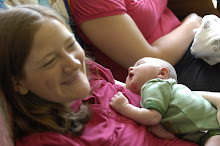A colleague of mine said she once heard a saying that resonated with her. "Midwives have good hands, and they know how to sit on them." I aspire to be that kind of midwife, but to be honest, when you're revered as a "medical authority," sitting on your hands can be kind of tough.
Today was my first time facilitating a Centering Pregnancy group. This is an alternative model of prenatal care which gathers 8-12 pregnant women due around the same time and has them meet in a group instead of one-on-one with a health care provider (we still do belly checks, fetal heart tones and all that, but in a corner of the room during a small portion of the two hour session). Women take their OWN blood pressures and their OWN weights and share them with me, instead of the reverse, which gives them ownership of their health care during pregnancy. The midwife is there to focus and guide discussion, but is called a "facilitator" and is ABSOLUTELY NOT supposed to be didactic. She is supposed to guide the discussion toward answering the questions and addressing the concerns of that specific group of pregnant women. And worst of all (GASP!), she's supposed to let women answer each others' questions instead of jumping in to answer them herself.
As an undergraduate anthropology major, I am in love with this model of care. It has all the hierarchy-busting, authority-challenging, alternative characteristics that I've wanted to shove in the medical establishment's face ever since I became a nurse-midwife. AND it actually improves outcomes, unlike most routine medical interventions in obstetrics. In my opinion, it's because this model of prenatal care acknowledges truths that no one else wants to acknowledge, namely:
1. It's not my machines and tests that keep the baby alive, but the pregnant woman herself.
2. No matter what I say, women will always trust their mother, their sister or their best friend more.
3. Most women who ask me questions already know the answers.
So why is this model, which makes so much sense to the anthropologist in me, also kind of challenging for my nurse-midwife self? Well, it turns out that I kind of LIKE being the authority. It's a little hard to sit on my hands when I have the opportunity to make myself look smart. Sometimes I feel like that obnoxious grade schooler popping her hand up all day long..."Call on me! Call on me!" I get some satisfaction from being the one with all the answers. In addition, part of me fears that my patients DON'T know what they're talking about and, like little children, require my guidance to avoid going astray.
How conceited of me. It turns out I underestimated my patients badly. Take this situation for example: Today in group the women were asked to evaluate several areas of their lives and decide whether they're "contenta" or "podria mejorar." Several women stated that they could improve when it came to exercise habits, and a discussion ensued. One woman said she likes to walk. Another said that she did too, but it's hard because there's no where to walk in Wisconsin in the wintertime. I said that the mall was a good place to walk. The woman laughed and said she was afraid she'd spend too much money if she walked at the mall. Just as I was about to jump in to defend myself, another participant shared that the mall is open for walkers in the morning long before the stores open, and suggested they might walk together then. Now THAT's what you can't do in a 15 minute visit to the doctor's office.
So sitting on my hands isn't yet easy, but I've decided it will be an important skill if I'm going to be a good Centering Pregnancy facilitator. Today in the "relationship with the baby's father" category, one participant answered that she could improve. When asked if she wanted to share, she confessed to the group that her partner is currently in jail for 18 months for beating her, and that he wouldn't make the birth of his child. After her lengthy explanation of their relationship, fraught with difficulty, there was silence among the group. For once I found it easy not to jump to answer. Then a quiet woman across the circle, with a look of deepest sympathy in her eyes, nodded and said "Si. Podria mejorar."


